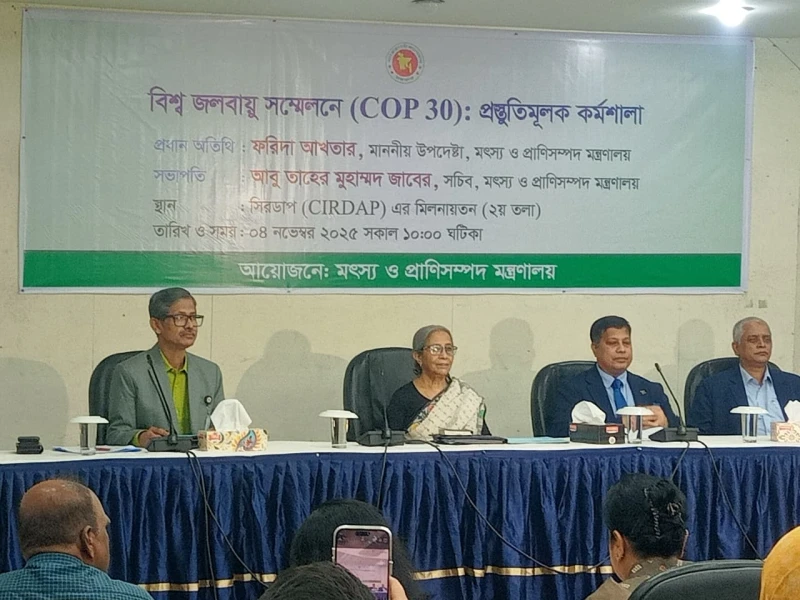Bangladesh’s preparations for the upcoming COP-30 climate summit in Brazil have revealed significant coordination gaps among ministries and stakeholders, even as the Ministry of Fisheries and Livestock gears up to join the global conference for the first time.
For the first time, the ministry will participate alongside the Ministry of Environment, Forest and Climate Change. However, the absence of inter-ministerial coordination may weaken Bangladesh’s ability to present its unified position on climate impacts, said Farida Akhter, Adviser to the Ministry of Fisheries and Livestock.
Speaking at a preparatory workshop titled “World Climate Conference COP-30: Preparatory Workshop” held on Tuesday, she said, “Everyone assumes COP is only the responsibility of the Environment Ministry. But ministries like Fisheries, Education, Agriculture, Disaster Management, and Women and Children Affairs are also intrinsically linked. One ministry alone cannot ensure proper representation at COP.”
She noted that this year, the Ministry of Fisheries and Livestock will attend the COP summit for the first time at the initiative of the Food and Agriculture Organization (FAO). “We will highlight how the climate crisis is adversely affecting the country’s fisheries and livestock sectors,” she said.
Pointing to the lack of coordination not only among ministries but also between government and non-government entities, Farida Akhter said, “At this COP, we must forget who represents the government and who represents NGOs — we all represent Bangladesh.”
Environmentalists and NGO representatives present at the event alleged that unlike Bhutan or Indonesia, Bangladesh has shown little effort in creatively presenting its pavilion at past COP summits.
This year, Bangladesh’s pavilion will feature exhibits and visuals on local species such as Hilsa and Black Bengal Goat to showcase how climate change is impacting fisheries and livestock resources,” the adviser added.
She further emphasized the need for closer coordination between government delegates and civil society representatives at this year’s summit. Expressing concern, she noted that as Bangladesh approaches graduation from the LDC category, the country’s access to the Loss and Damage Fund remains uncertain.
We can no longer play the victim. We must demand compensation as our rightful claim,” she said firmly.
Highlighting the regional gap, she observed that Asian countries — especially those in South Asia — still lack collective coordination at COP compared to African nations, which present united positions on climate issues.
Due to climate impacts, Bangladesh’s capture fisheries sector has suffered significant losses, she said, adding that “while 60 percent of fish demand once came from capture fisheries, that share has now dropped by more than 20 percent.”
Major countries still think they are immune to the effects of climate change. But even the U.S. is now facing floods — this is the consequence of the climate crisis. Everyone must act to confront it,” she urged.
The workshop was chaired by Fisheries and Livestock Secretary Abu Taher Muhammad Jaber.


 Prev Post :
Prev Post :
